- Clone
- MTS510 (See other available formats)
- Regulatory Status
- RUO
- Other Names
- Toll-like Receptor 4/MD2 complex, TLR4-MD2-complex, TLR4/MD2, CD284/MD2
- Isotype
- Rat IgG2a, κ
- Ave. Rating
- Submit a Review
- Product Citations
- publications
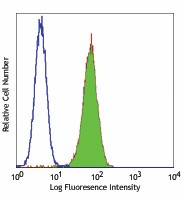
-

Mouse TLR4/MD2 transfected cells were stained with Ultra-LEAF™ purified CD284 (clone MTS510) (filled histogram), or Ultra-LEAF™ purified rat IgG2a, κ (open histogram), followed by anti-rat IgG FITC. -

FFPE mouse gut was stained with Purified Anti-Mouse TLR4/MD2 Complex (Cat# 117602) or Purified Rat IgG2a, κ at 1:50 (10 µg/mL) using 10 mM Sodium Citrate Buffer pH 6.0 for antigen retrieval and polymer detection system. Cellular localization: Cell Membrane.
Top: Positive Ctrl: FFPE Mouse Gut, 20X Magnification; Bottom: Negative Ctrl: FFPE Mouse Gut, 20X Magnification -

FFPE mouse gut was stained with Purified Anti-Mouse TLR4/MD2 Complex (Cat# 117602) or Purified Rat IgG2a, κ at 1:50 (10 µg/mL) using 10 mM Sodium Citrate Buffer pH 6.0 for antigen retrieval and polymer detection system. Cellular localization: Cell Membrane.
Top: Positive Ctrl: FFPE Mouse Gut, 20X Magnification; Bottom: Negative Ctrl: FFPE Mouse Gut, 20X Magnification
| Cat # | Size | Price | Quantity Check Availability | Save | ||
|---|---|---|---|---|---|---|
| 117617 | 100 µg | $270 | ||||
| 117618 | 1 mg | $677 | ||||
Toll-like receptors are highly conserved from Drosophila to humans and share structural and functional similarities. They are type I transmembrane signaling receptors which activate the innate immune system in response to pathogen invasion. So far, at least 13 TLR members have been identified. The secretory protein, MD2, associates with cell-surface bound TLR4 (CD284) on monocytes, B cells and T cells. TLR4 has been recognized as critical for host recognition of bacterial LPS in conjunction with MD2.
Product DetailsProduct Details
- Verified Reactivity
- Mouse
- Antibody Type
- Monoclonal
- Host Species
- Rat
- Immunogen
- Ba/F3 cell line transfected with mouse TLR4 /MD2 complex
- Formulation
- 0.2 µm filtered in phosphate-buffered solution, pH 7.2, containing no preservative.
- Endotoxin Level
- Less than 0.01 EU/µg of the protein (< 0.001 ng/µg of the protein) as determined by the LAL test.
- Preparation
- The Ultra-LEAF™ (Low Endotoxin, Azide-Free) antibody was purified by affinity chromatography.
- Concentration
- The antibody is bottled at the concentration indicated on the vial, typically between 2 mg/mL and 3 mg/mL. Older lots may have also been bottled at 1 mg/mL. To obtain lot-specific concentration and expiration, please enter the lot number in our Certificate of Analysis online tool.
- Storage & Handling
- The antibody solution should be stored undiluted between 2°C and 8°C. This Ultra-LEAF™ solution contains no preservative; handle under aseptic conditions.
- Application
-
FC - Quality tested
IHC-P - Verified
ICFC, IP, Block - Reported in the literature, not verified in house - Recommended Usage
-
Each lot of this antibody is quality control tested by immunofluorescent staining with flow cytometric analysis. For flow cytometric staining, the suggested use of this reagent is ≤ 0.25 µg per million cells in 100 µL volume or 100 µL of whole blood. It is recommended that the reagent be titrated for optimal performance for each application.
- Application Notes
-
Anti-mouse TLR4 clones SA15-21 and MTS510 recognize distinct epitopes and don’t cross block each other.8 Clone MTS510 binds to an epitope of TLR4/MD-2 that is lost after LPS stimulation.8 In addition to flow cytometric uses, the MTS510 antibody has also been used for immunoprecipitation, immunofluorescence, and blocking of LPS-induced stimulation. The LEAF™ purified antibody (Endotoxin <0.1 EU/µg, Azide-Free, 0.2 µm filtered) is recommended for functional assays (Cat. No. 117607). For highly sensitive assays, we recommend Ultra-LEAF™ purified antibody (Cat. No. 117612) with a lower endotoxin limit than standard LEAF™ purified antibodies (Endotoxin <0.01 EU/µg).
-
Application References
(PubMed link indicates BioLegend citation) -
- Akashi S, et al. 2000. J. Immunol. 164:3471. (FC, ICFC, IP, Block)
- Kawasaki K, et al. 2003. J. Immunol. 170:413. (FC)
- Nalbandian G, et al. 2005. J. Immunol. 175:2666. (FC) PubMed
- Kanada S, et al. 2011. Blood 117:2211. PubMed
- Laplate P, et al. 2011. J. Biol Chem. 286:42494. PubMed
- Khan MA, et al. 2006. Infect. Immun. 74:2522. (IF)
- Tanigawa T, et al. 2013. Innate Immun. 19:115. PubMed
- Akashi S, et al. 2003. J. Exp. Med. 198:1035.
- Product Citations
-
- RRID
-
AB_2819836 (BioLegend Cat. No. 117617)
AB_2819836 (BioLegend Cat. No. 117618)
Antigen Details
- Structure
- Type I transmembrane protein complex
- Distribution
-
Monocytes, B cells and T cells
- Function
- Activates the innate immune system against Gram-negative bacterial pathogens by recognition of LPS
- Ligand/Receptor
- Bacterial LPS
- Cell Type
- B cells, Dendritic cells, Monocytes, T cells, Tregs
- Biology Area
- Immunology, Innate Immunity
- Molecular Family
- CD Molecules, Toll Like Receptors
- Antigen References
-
1. Frleta D, et al. 2003. J. Leukocyte Biol. 74:1064.
- Gene ID
- 21898 View all products for this Gene ID
- UniProt
- View information about TLR4 MD2 Complex on UniProt.org
Related Pages & Pathways
Pages
Related FAQs
- Do you guarantee that your antibodies are totally pathogen free?
-
BioLegend does not test for pathogens in-house aside from the GoInVivo™ product line. However, upon request, this can be tested on a custom basis with an outside, independent laboratory.
- Does BioLegend test each Ultra-LEAF™ antibody by functional assay?
-
No, BioLegend does not test Ultra-LEAF™ antibodies by functional assays unless otherwise indicated. Due to the possible complexities and variations of uses of biofunctional antibodies in different assays and because of the large product portfolio, BioLegend does not currently perform functional assays as a routine QC for the antibodies. However, we do provide references in which the antibodies were used for functional assays and we do perform QC to verify the specificity and quality of the antibody based on our strict specification criteria.
- Does BioLegend test each Ultra-LEAF™ antibody for potential pathogens?
-
No, BioLegend does not test for pathogens in-house unless otherwise indicated. However, we can recommend an outside vendor to perform this testing as needed.
- Have you tested this Ultra-LEAF™ antibody for in vivo or in vitro applications?
-
We don't test our antibodies for in vivo or in vitro applications unless otherwise indicated. Depending on the product, the TDS may describe literature supporting usage of a particular product for bioassay. It may be best to further consult the literature to find clone specific information.
Other Formats
View All TLR4 (CD284)/MD2 Complex Reagents Request Custom Conjugation| Description | Clone | Applications |
|---|---|---|
| Purified anti-mouse TLR4 (CD284)/MD2 Complex | MTS510 | FC,IHC-P,WB,ICFC,IP |
| Biotin anti-mouse TLR4 (CD284)/MD2 Complex | MTS510 | FC |
| PE anti-mouse TLR4 (CD284)/MD2 Complex | MTS510 | FC |
| PE/Cyanine7 anti-mouse TLR4 (CD284)/MD2 Complex | MTS510 | FC |
| Ultra-LEAF™ Purified anti-mouse TLR4 (CD284)/MD2 Complex | MTS510 | FC,IHC-P,ICFC,IP,Block |
| TotalSeq™-A0875 anti-mouse TLR4 (CD284)/MD2 Complex | MTS510 | PG |
| TotalSeq™-C0875 anti-mouse TLR4 (CD284)/MD2 Complex | MTS510 | PG |
| TotalSeq™-B0875 anti-mouse TLR4 (CD284)/MD2 Complex | MTS510 | PG |
Customers Also Purchased
Compare Data Across All Formats
This data display is provided for general comparisons between formats.
Your actual data may vary due to variations in samples, target cells, instruments and their settings, staining conditions, and other factors.
If you need assistance with selecting the best format contact our expert technical support team.
-
Purified anti-mouse TLR4 (CD284)/MD2 Complex
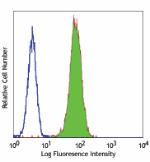
Mouse TLR4/MD2 transfected cells were stained with purified ... 
FFPE mouse gut was stained with Purified Anti-Mouse TLR4/MD2... 
FFPE mouse gut was stained with Purified Anti-Mouse TLR4/MD2... 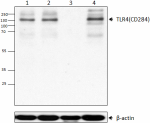
Western blot analysis of Raw264.7 untreated (lane 1), Raw264... -
Biotin anti-mouse TLR4 (CD284)/MD2 Complex
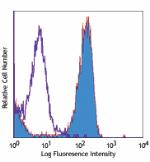
Thioglycollate-elicited mouse peritoneal macrophages were st... -
PE anti-mouse TLR4 (CD284)/MD2 Complex
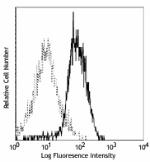
Thioglycollate-elicited mouse peritoneal macrophages were st... -
PE/Cyanine7 anti-mouse TLR4 (CD284)/MD2 Complex
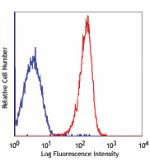
Mouse TLR4/MD2/CD14 transfected cells were stained with CD2... -
Ultra-LEAF™ Purified anti-mouse TLR4 (CD284)/MD2 Complex
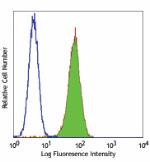
Mouse TLR4/MD2 transfected cells were stained with Ultra-LEA... 
FFPE mouse gut was stained with Purified Anti-Mouse TLR4/MD2... 
FFPE mouse gut was stained with Purified Anti-Mouse TLR4/MD2... -
TotalSeq™-A0875 anti-mouse TLR4 (CD284)/MD2 Complex
-
TotalSeq™-C0875 anti-mouse TLR4 (CD284)/MD2 Complex
-
TotalSeq™-B0875 anti-mouse TLR4 (CD284)/MD2 Complex

 Login/Register
Login/Register 






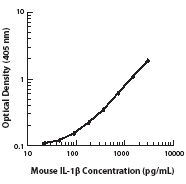




Follow Us